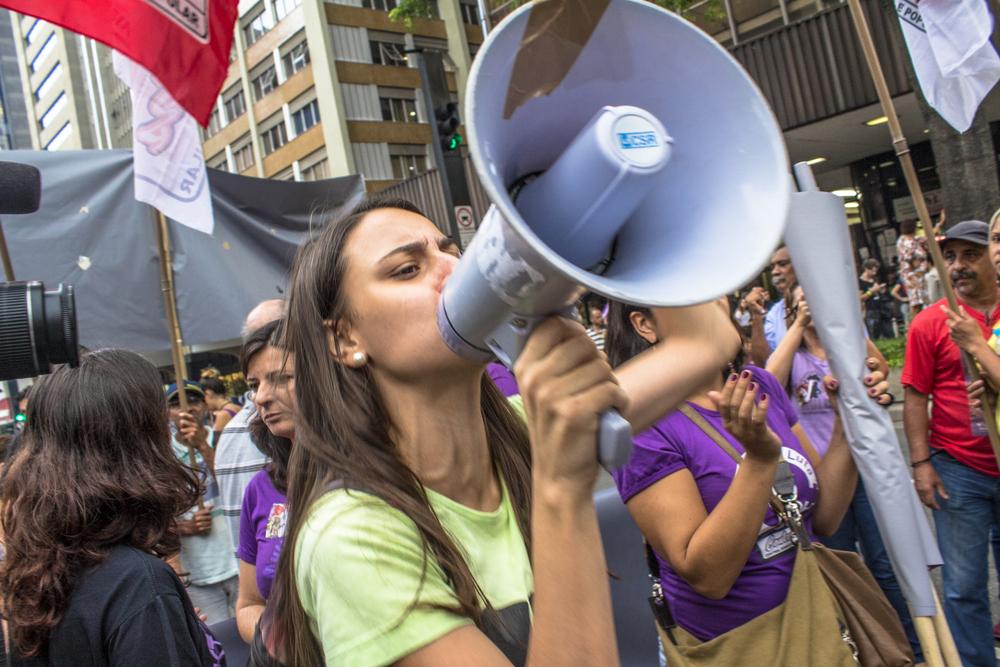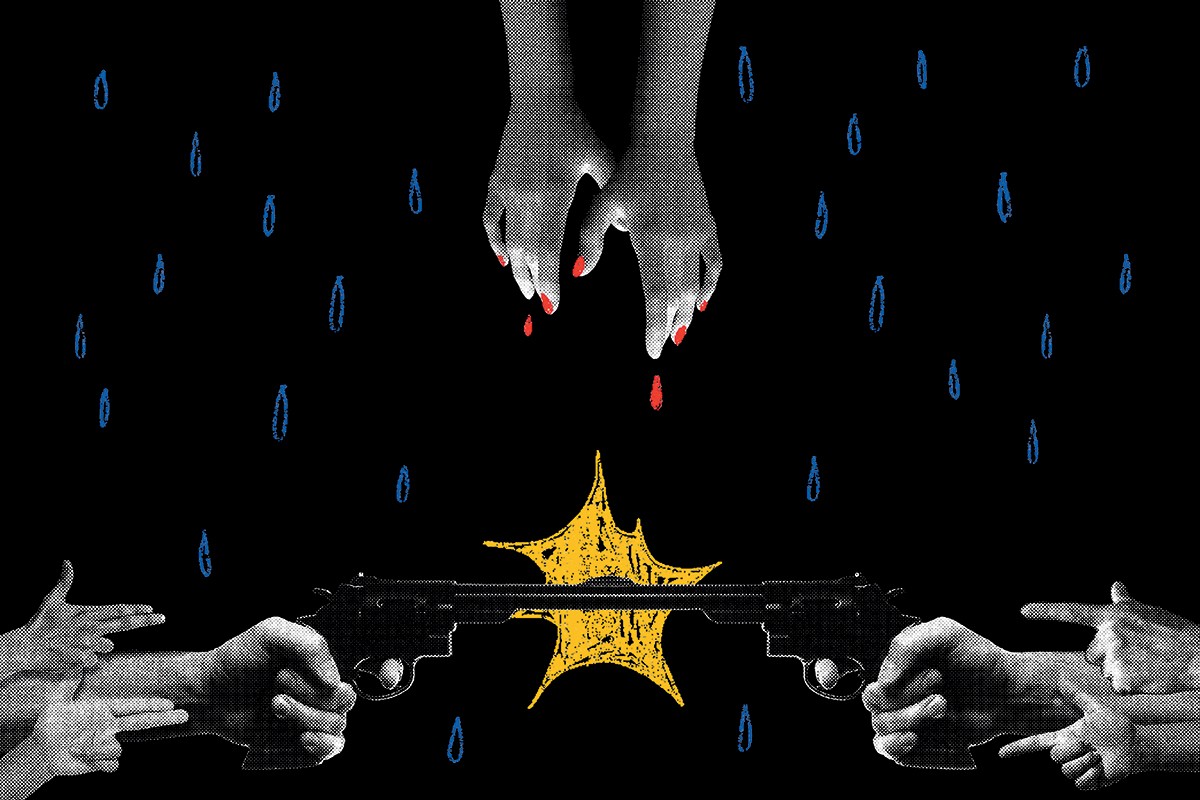
Every day since 6 May 2021, Sandra Gomes dos Santos has waited for a familiar sound: the front gate being unlocked and the call, “Mum, I'm here!” Every morning since that fateful day, Adriana Santana de Araújo has found herself checking her phone for a “good morning” text from her son.
Both women wait in vain. Their sons were among 28 people killed in the deadliest police raid in Rio de Janeiro state history. Heavily armed police stormed Jacarézinho, one of Rio’s largest favelas, in pursuit of drug traffickers. The attack occurred just a few days before Dia das Mães or Mothers’ Day. Santos and Araújo were just two of the many mothers who spent Dia das Mães burying their sons.
That was just the start of their ordeal. There was also the enervating business of simply living. “We have to survive every day,” said Araújo, as Santos nodded in agreement. Our interview took place in a samba school, just a few metres away from the entrance to Jacarézinho. Santos, who still lives here because she can’t afford to rent anywhere else, says she is in constant fear of the police on guard nearby. They are part of the Cidade Integrada, a programme that has police permanently posted within a favela, supposedly to protect residents from financial exploitation by gangs. But some of the policemen in Jacarézinho were part of the operation in which Santos’s son was killed.

As a nonprofit journalism organization, we depend on your support to fund more than 170 reporting projects every year on critical global and local issues. Donate any amount today to become a Pulitzer Center Champion and receive exclusive benefits!
Many of the bereaved mothers suffer with anxiety and depression. Araújo has not been able to grieve for her oldest son because she is consumed by the worry that her youngest will also be taken from her in the same way.
There is little in the way of compassion for the women’s losses. Instead, the mothers are vilified. “Do you know what we were called?” asked Araújo. “A criminal depository or criminal-making uterus. I am no depository nor do I have a uterus that produces criminals.”
The mothers of the Jacarézinho dead are largely invisible to the Brazilian state. Their children, direct victims of state violence, make up the statistics, but there is no accounting for the mothers, fathers, sons and daughters left behind. The relatives of victims bear deep scars that go mostly unseen.
“Having sons, partners and brothers killed in this battle with armed groups is a form of suffering that particularly affects women,” said José Claudio Souza Alves, a public security expert and professor at the Federal Rural University of Rio de Janeiro. "These women fall sick and eventually die."
This claim may not always be an exaggeration. Jozelita de Souza died in 2016, seven months after her son Roberto was killed in Costa Barros, another poor neighbourhood in Rio de Janeiro. Four police officers had fired more than 100 bullets at a car in which the unarmed 16-year-old sat with four friends. Nevertheless, the police tried to make the chacina or massacre look like self-defence. Jozelita’s cause of death was described by doctors as cardiorespiratory failure but a local news story said at the time: “She couldn’t bear the death of her son… The hairdresser died of sadness.”
A history of violence and failure
Violent police operations are not new to Brazil and, more particularly, to Rio de Janeiro. According to data compiled by the Brazilian Forum on Public Safety, an NGO, Brazilian police killed 6,416 people in 2020. In the state of Rio they killed 1,245 in 2020, according to data by the Network of Observatories on Security. Police killings nearly tripled between 2013 and 2020.
Alves believes that Rio de Janeiro is marked by “criminal politics”, with armed groups flourishing because of their direct relationship with the state. In the name of the ‘war on drugs’, police carry out operations in favelas controlled by drug rings. Experts have long pointed out that this strategy does not solve the problem, as those killed and arrested are most often low-level dealers. What’s more, police operations can merely lead to a change of hands: a territory that was once controlled by one faction or narcotrafficking group is taken over by a rival group, allegedly with the complicity of the police, who ‘clear the area’ to allow the rivals to step in.
The modus operandi of these operations is one of annihilation: special operations teams, outfitted as if for war, storm into communities in military vehicles, in pursuit of suspects.
These densely populated neighbourhoods are treated as laboratories for public security initiatives, many of which have been proved to fail in the past. The state government’s testing of Cidade Integrada in Jacarézinho is a case in point. The current programme is inspired by Pacifying Police Units (UPP), which pioneered the placement of police units in Rio favelas 14 years ago.
However, the police presence has created a state of permanent war, which is escalating as both sides acquire more powerful and lethal guns. Dani Monteiro, an elected member of the Rio de Janeiro State Assembly, explained, “This is something I always hear from public security agents: ‘We bought rifles because when the criminals had rifles, all we had were pistols. Then they had rifles and we also had rifles, but one day they showed up with 762s [a more powerful rifle]. So we bought 762s as well, but then they came in with long-range machine guns, so we had to buy those too’.”
Pro-gun policies
Experts suggest that the intensifying state of permanent war in Rio’s favelas is a reflection of the rising number of guns in civilian hands in general. This is the result of policy changes, not least President Jair Bolsonaro’s pro-gun agenda. Since taking office on 1 January 2019, Bolsonaro has introduced more than 30 legal changes that make it easier for civilians to gain access to firearms. But the removal of controls facilitates the diversion of weapons to organised crime groups.
"The federal government, exemplified by Bolsonaro, argues that pro-gun policies will help citizens fight crime, but in reality it’s crime that benefits from these policies," explained Cecília Olliveira, a journalist, public security expert and executive director of collaborative digital database Fogo Cruzado. The database, which means ‘crossfire’ in Portuguese, collates data on armed violence in Rio de Janeiro and Recife in north-east Brazil. She added that easier access to guns had been matched by a loosening of control and oversight, without a corresponding expansion of the police’s ability to investigate gun crime.
In her April 2021 decision to suspend some parts of the presidential decrees to expand access to weapons, Supreme Court Justice Rosa Weber said that 55% of all firearms apprehended from criminals had been legal before they were stolen or illegally sold. This was according to data from the CPI das Armas, a 2006 congressional parliamentary commission that investigated arms trafficking.
Alves, from the Federal Rural University of Rio de Janeiro, described the result of easier access to weapons as an “arms build-up… insecurity in all areas”, in which those who can afford it, “even if not involved with armed criminal groups, will arm themselves for self-protection or to profit”. He added: “This [situation] expands the justification for the use of firearms because it creates a war zone. And in war zones, the logic is one of armed self-protection.”
The police justification for the 6 May 2021 Jacarézinho raid is an example of this ‘war zone’ mentality. According to the police, the operation was part of an investigation into underage recruitment by drug trafficking groups. But many of the victims’ families say their sons were innocent, and even though Araújo admitted that her dead son, mototaxi driver Marlon Santana de Araújo, was involved in crime, she said he was no more than a varejista, slang for people at the lower end of the drug trafficking hierarchy. Marlon was also a victim, Adriana believes, because, as a young Black man from a favela, he suffered from structural racism, which excluded him from many opportunities.
Racial bias
The statistics on deaths at the hands of the police point to a clear racial bias. In 2020, according to data compiled by the Fórum Brasileiro de Segurança Pública (FBSP), an NGO that works on public security, 78.9% of all victims of police intervention in Brazil were Black. That number has stayed constant for decades. According to the FBSP, this shows “the deficit in fundamental rights [of] the Black population”.
And if a young Black man is jailed for a minor felony, there is always the chance he will be lost forever, transformed both by the violence to which he is subjected and the exposure to organised crime networks that operate inside Brazilian prisons.
Rio human rights activist Monica Cunha saw this first hand with her son Rafael. Arrested at age 15, he spent five years at a correctional facility for minors. It transformed him. “I saw Rafael’s changes. I saw how he went into the system and then who he became,” she recalled. “On 5 December 2006, when they laid my son’s bullet-ridden body on the ground in front of me, that Rafael was no longer my Rafael. He was transformed in the five years he was inside the system.”
Cunha subsequently founded Movimento Moleque, an NGO that helps mothers of victims of state violence to organise. She also urges them not to let people call their dead children criminals. “I didn't give anyone a blank cheque to speak of Rafael,” she said. “I’m the only one allowed to speak of him. I birthed him, raised him, breastfed him. I saw when he began changing. No one can speak of him but me. This is what I tell these women: don’t let anyone say your son is a criminal. He might be a varejista, because all we have here [in favelas] are varejistas, but not criminals.”
Bolsonaro took to Twitter to vilify the bereaved relatives and to congratulate the police for killing 'drug dealers that rob, kill and destroy families'
After the Jacarézinho raid, Bolsonaro took to Twitter to vilify the bereaved relatives and to congratulate the police for killing “drug dealers that rob, kill and destroy families”. At the time of his declaration, a police inquiry into the real involvement of the men killed with criminal activity had yet to begin. The president was also pictured with a plaque that bore the words “CPF cancelado”, slang for people killed in a police operation.
The number of bereaved mothers and relatives of victims of state violence continues to grow. In May, a year on from the police operation in Jacarézinho favela, there was a shootout that left 23 dead in Vila Cruzeiro, a favela in Rio’s northern zone.
No action, no investigations
Meanwhile, the bereaved mothers of Jacarézinho remain haunted by the authorities’ inaction. The Public Prosecutor’s Office has closed inquiries into 24 of the deaths, charging officers with homicide and tampering with evidence in just three of the killings. Santos’s son, Matheus, is one of those whose case has been dropped. She says he was killed sitting, unarmed, in a plastic chair while he had an epileptic seizure. “[He] had no drugs on him and they killed him.”
Olliveira, of Fogo Cruzado, said the Public Prosecutor’s Office should be holding police accountable. “It has the responsibility of overseeing the police. The omission of the Public Prosecutor’s Office means the maintenance of a status quo for a police force that kills and dies a lot – in this case, kills more than dies.”
In fact, she added, a unit within the Public Prosecutor’s Office meant to oversee police actions had been depleted of staff and resources, resulting in a backlog of cases awaiting investigation.
The Jacarézinho raid was an outlier. It attracted national and international attention and actually led to an investigation. Many victims of armed violence never have their deaths investigated. Worse, their bodies are never found. This burden is then transferred to the victims’ relatives, usually women, according to Adriano de Araújo, a sociologist and coordinator with Fórum Grita Baixada, a social movement fighting for human rights, public security and justice in the Baixada Fluminense region of greater Rio.
“It is normally the women who get involved in searching for the victim.
"They are the ones visiting hospitals and morgues, putting up posters, gathering friends to search together. They are the ones going inside crack houses, speaking to the militias,” she said. “Then there is double violence because – besides not knowing where their sons, grandsons or brothers are – they have to hear that they have been negligent, that they are not good mothers or good spouses.”
The blame and shame contributes to the women’s suffering. Many of them already have prior health issues for lack of healthcare. “They stop taking care of themselves, they stop going to doctors’ appointments, forget to take their medications because this search for justice drains them emotionally,” said Araújo.
They also suffer the additional financial burden of losing a source of income for the family, something that matters in families where the woman is already the primary breadwinner.
No right to memory
One year on from the Jacarézinho operation, it remains an open wound. Every time there are attempts to heal, the wound is ripped open again. On 11 May 2022, less than a week after the first anniversary of the massacre, a simple memorial put up by relatives of the victims and other favela residents was torn down by police. In a scene heavy with symbolism, the small memorial plaque bearing the names of all the victims was pulled apart by a caveirão, an armoured vehicle. “No death shall be forgotten, no chacina shall be normalised,” the plaque had read.
"Memorials like the one in Jacarézinho are proof of life and a demonstration of the hope that brutality and arbitrariness will be remembered to not be repeated,” wrote prominent journalist Flávia Oliveira in her column in O Globo newspaper after the memorial was removed. “All this was taken away from the relatives of the ones killed during the massacre by the same public power which provoked it,” she added.
Meanwhile, the mothers of the Jacarézinho dead and other victims of police violence are doing their best to prevent the story from being rewritten, or erased altogether, by the state. In Rio de Janeiro and elsewhere in Brazil, collectives or groups of mothers and relatives of victims of state violence serve as support groups as well as living memorials to the young lives lost.
Cunha of Movimento Moleque says the mothers have a role model – the mothers of Acari. Those women from Rio’s Acari favela set out to discover the circumstances of the kidnapping and murder by police of 11 teenagers in July 1990. “They are a compass for us,” said Cunha. “The women who make us see that we cannot afford to stop.”
For these mothers, grief and memory are disputed territory, but one for which they continue to fight. To the state they are invisible – the collateral damage of armed violence – but to each other, they are lighthouses in the dark.











